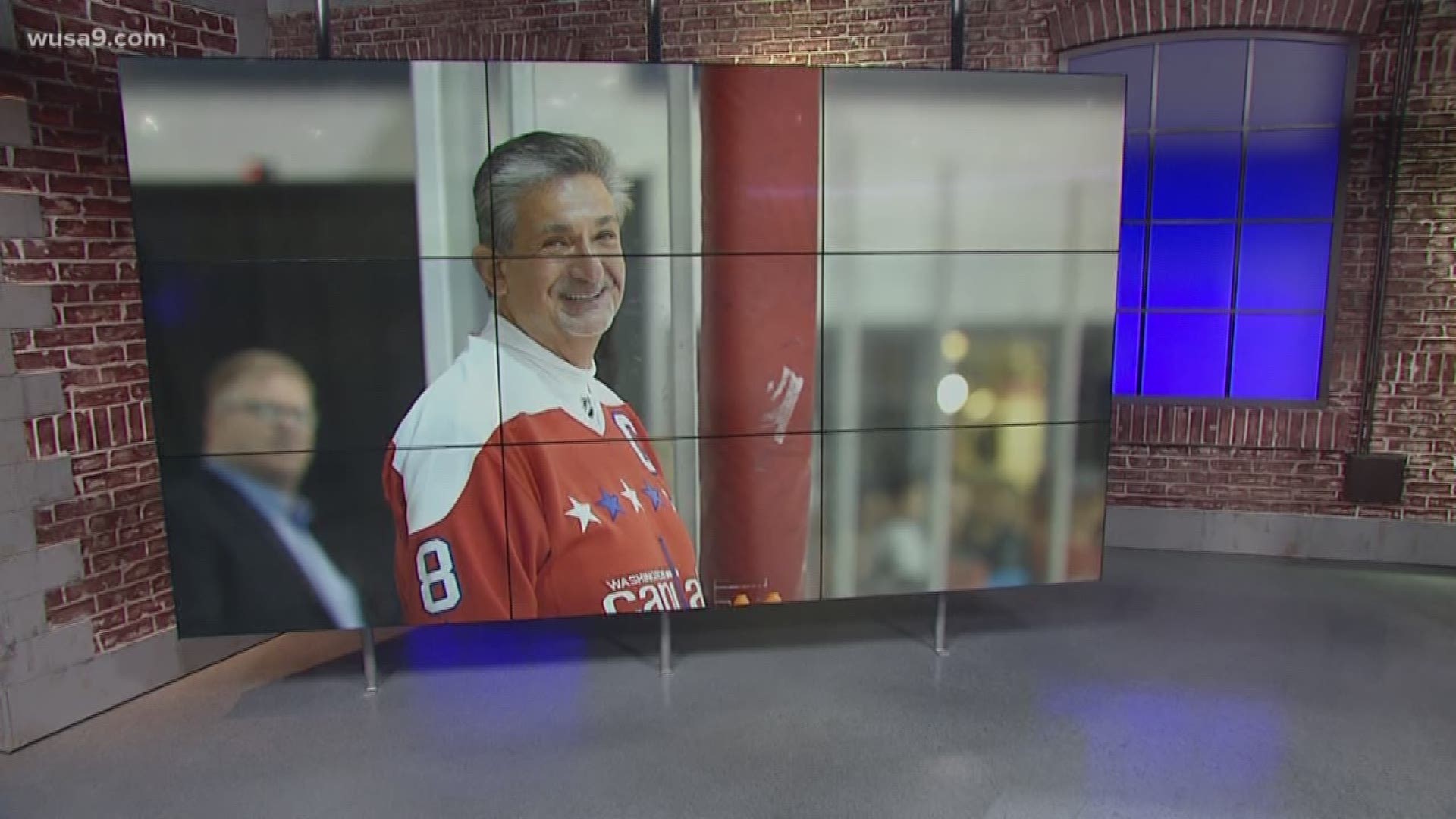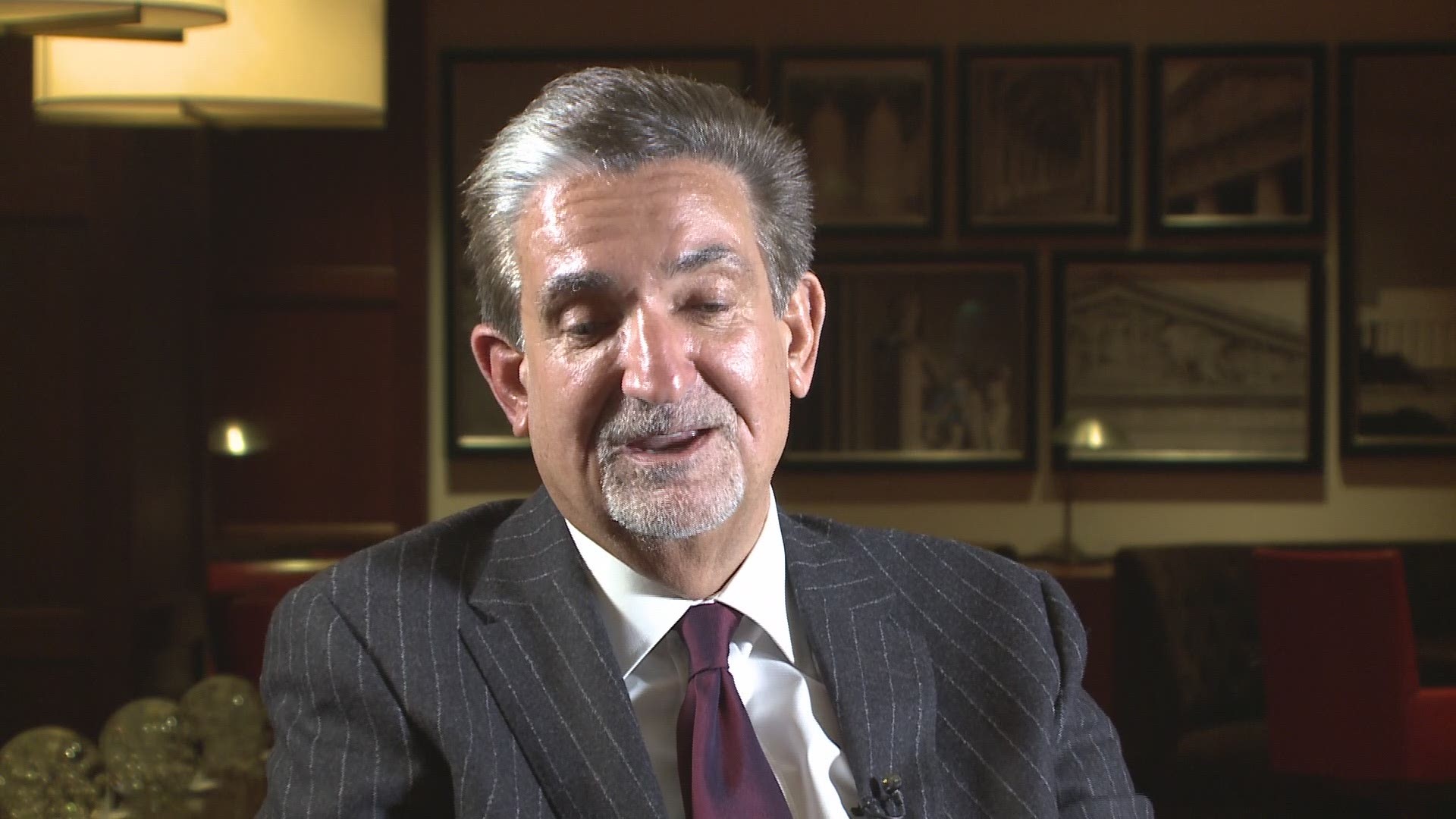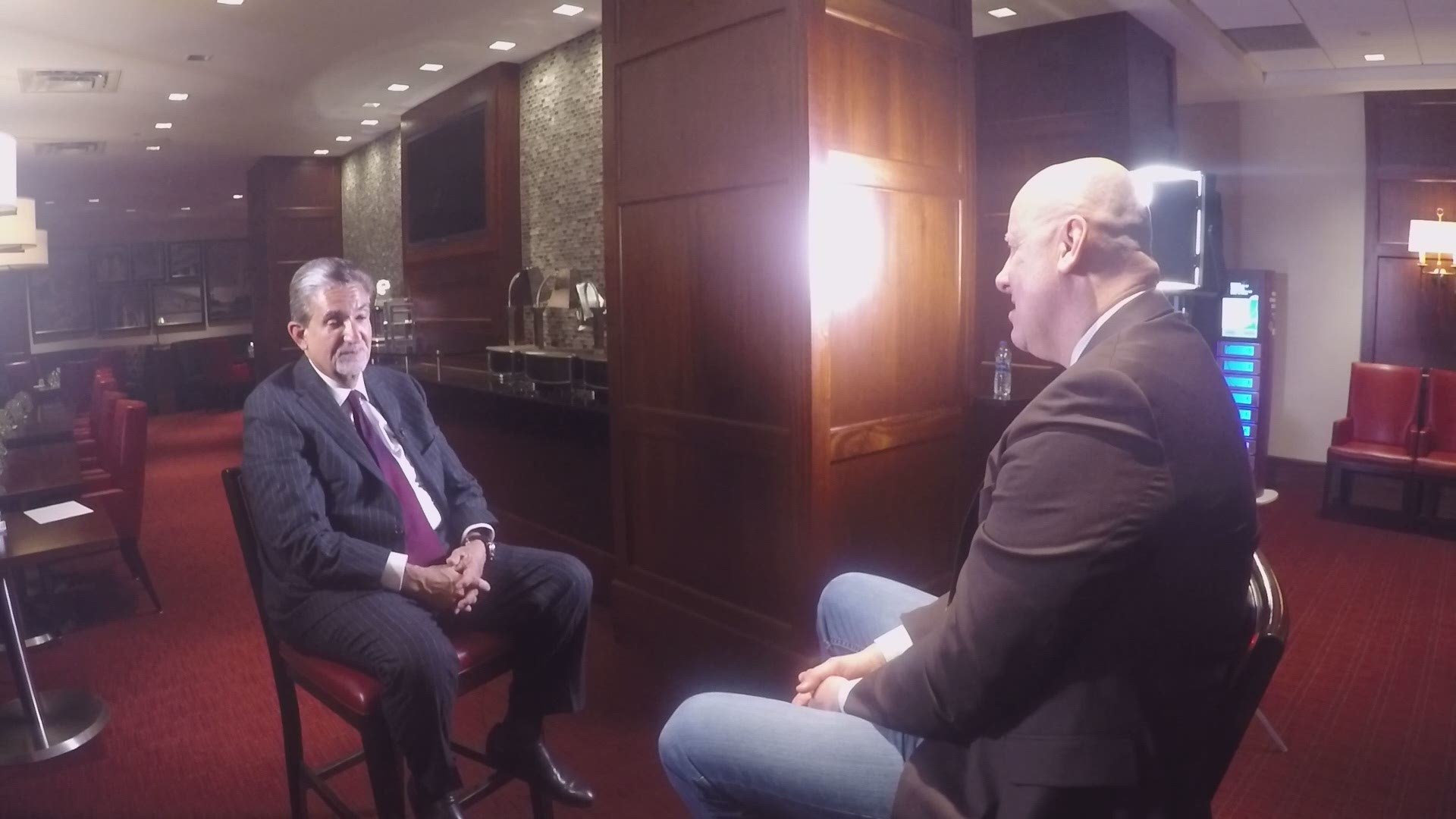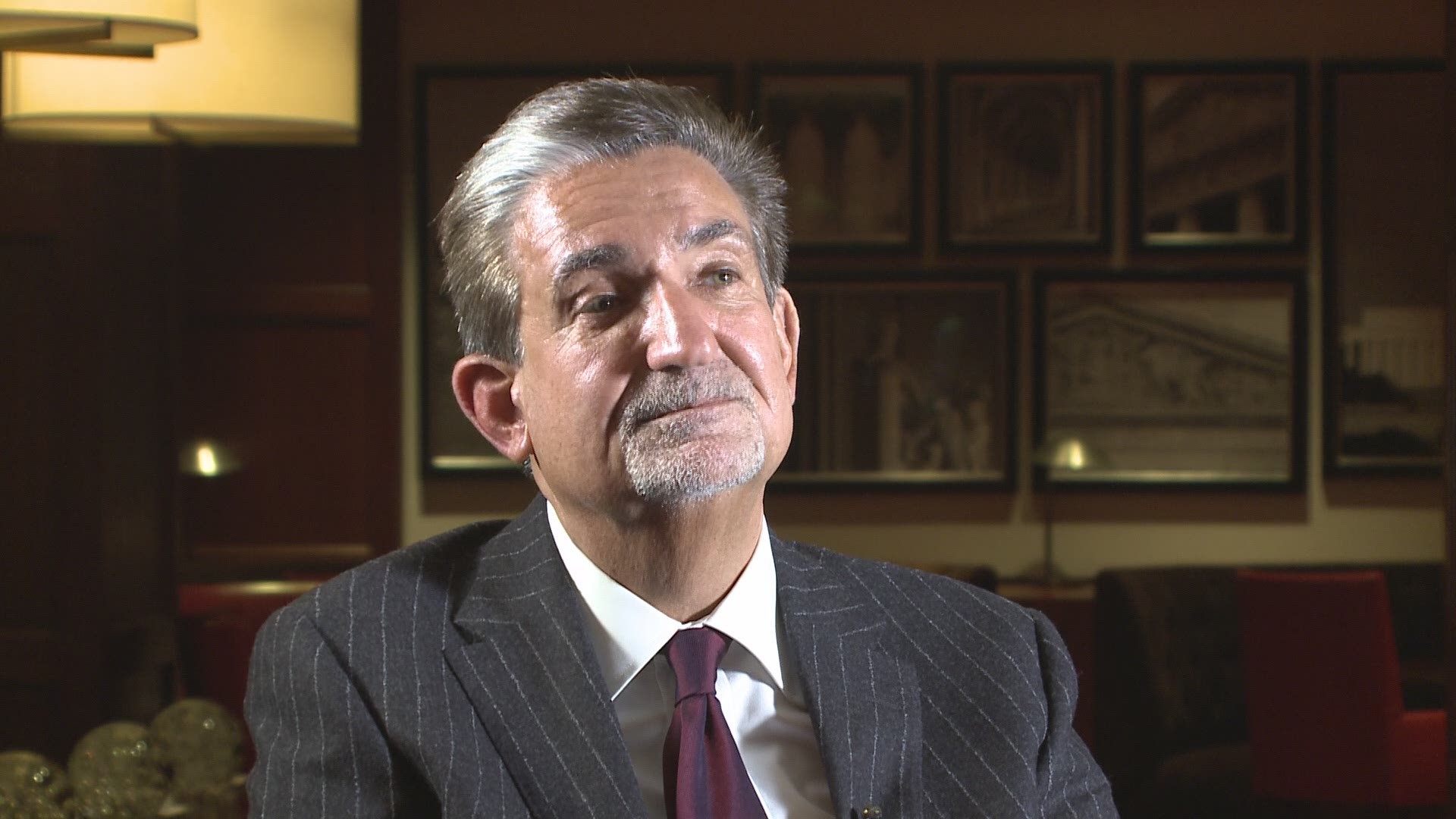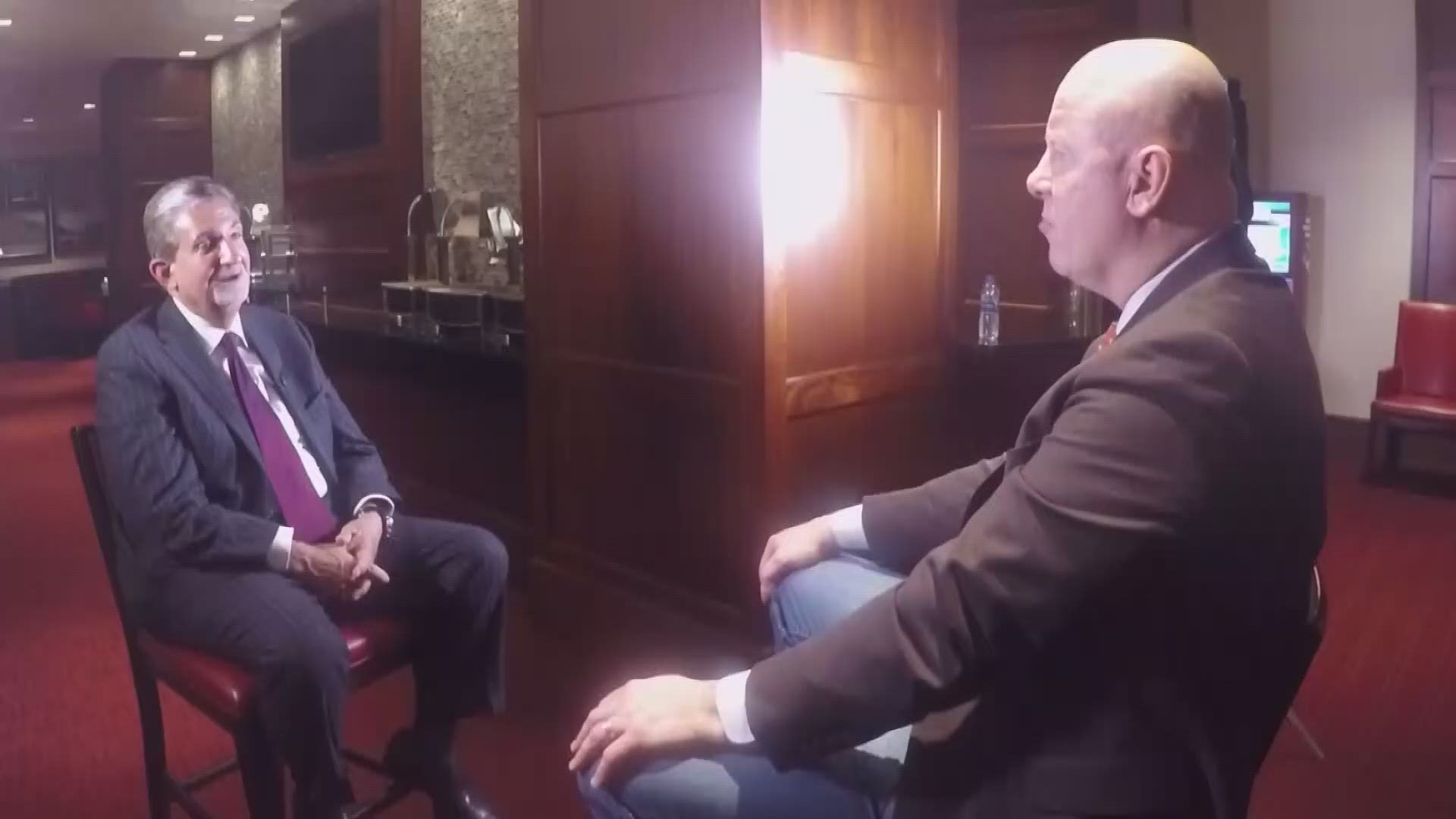WASHINGTON — Ted Talked. And talked. And talked some more. And 45 minutes later, the chairman of Monumental Sports & Entertainment and principal owner of the Washington Capitals and Wizards nearly distilled a Theodore John Leonsis Treatise.
Ted talked about the state of his teams, including the future of Wizards team president Ernie Grunfeld; the end of illegal sports gambling in the District, and the 24/7, art-deco betting parlor and restaurant soon to be built inside Capital One Arena; and, yes, the majestic moment last June he walked on the ice with the team that delivered the Stanley Cup to Washington, Maryland, Virginia – along with every 50-plus, beaten-down fan with a Dale Hunter jersey, who, after 43 years of heartbreak, could now die happy.
“I cried my eyes out, yeah," Leonsis said. "And I cried for all of the players, all of the coaches, all of the fans, all of the disappointment that we had.
"I never wanted to lose faith, you know. But you have self-doubt. 'Do we know what we're doing? Can we ever get there?' And you also don't want to be labeled. I never wanted Alex to be Charles Barkley [a Hall-of-Fame player who never won a title.] I wanted Alex to take his rightful place in history."
The 4 games to 1 victory over the Las Vegas Knights dissolved not just years of playoff frustration and soul-siphoning Aprils and Mays for a team that had lost numerous Game 7s on its home ice, changed the cast of characters and coaches around Ovechkin and Nicklas Backstrom several times and could never scale those damn Pittsburgh Penguins and Sidney Crosby when it mattered; no, the Caps winning the Stanley Cup brought relief and joy to a generation of Greater Washington sports fans, many of whom were not born when Joe Gibbs last coached Washington to a Super Bowl victory in 1992.
If the trip from the owner’s suite to the ice was surreal, so too was the journey down Constitution Avenue on the way to the championship parade. Leonsis said he made sure to tell every player on the roster he could to take note of the children’s faces – because he was one of those kids in 1969 after Joe Namath led the Jets to an upset victory over the Baltimore Colts in Super Bowl III.
“We turned down Constitution Ave. and I couldn't process what I was seeing because there were so many people," Leonsis said. "It was as far as the eye could see. People had signs. It just reminded me: when I was a kid, one of the indelible moments of my life was my dad took me to the New York Jets' Super Bowl parade [after Joe Namath led the Jets to a stunning upset over the favored Baltimore Colts]. I stood on my father's shoulders. I mean, I can close my eyes and bring that up. And I became really intent as we were going down with Alex and Nick [Backstrom] and Brooks [Orpik], 'Look at the kids. Wave to the kids. Because they'll remember that image. And they'll tell their kids and their kids will tell their grandchildren about it. This is one of those days that lasts a lifetime.
"So the parade to me was, let's do that one again."
The Cup itself became a character in the journey the past seven months. For all the cereal and milk eaten out of it – the trips to Hockeytown, U.S.A., with T.J. Oshie, and Moscow’s Red Square with Ovechkin, Leonsis still remembers one of the first places his star player and he brought sports’ most famous trophy to: the Georgetown University Oncology Center, where many terminally ill kids reached out and touched it as if it was a talisman.
“It was unbelievable -- almost like when they were touching the Cup it had magical healing powers or something," Leonsis said. "And then we took it to Fort DuPont [ice rink in Southeast]. Those were our two places."
Comfortable and candid darting back and forth between topics in the posh owners’ club beneath the Capital One stands on the arena floor level, Leonsis made clear he is more than ready to dive into the sports-betting industry after years of it being taboo among North American major revenue sports leagues.
Leonsis said betting information would be available as early as April to Capitol One Arena patrons, but the actual construction and building of the sports book probably won't make wagering a reality until the end of the year at the earliest.
"The vision would be that we would take our building and re-imagine it," Leonsis. said. "Instead of it being a building that opens at 6 at night and closes at 10 o'clock...." Then he goes off on a tangent how wrong it is that his building does not already keep Vegas hours:
"We pay for this building 24 hours a day. And we have a cage up -- we don't want anyone going into the building! It's really remarkable...As opposed to when you go into Las Vegas and they keep it open 24 hours a day and they're pumping in oxygen..."
He calms down and stays on message: "So we would like to re-imagine the arena and take a big piece of real estate and then partner with someone who is great at developing a sports book. But then the environment around that -- someone that would construct and build a beautiful restaurant with fine food and high fidelity of bandwidth to deliver the information, and big screens that would subscribe to rugby games and soccer games and tennis matches. And maybe someone would just want to come in and have lunch and be with their friends and make some bets."
On his teams, he seemed less worried about the Capitals’ uneven season defending the Cup – they have now moved within a game of the New York Islanders for first place in the NHL’s Metropolitan Division – than the immediate future of the once-again, woebegone Wizards.
Less than two years ago, the Wizards took the Boston Celtics to Game 7 of the NBA’s Eastern Conference semifinals, advancing farther than any Washington professional basketball team had since the 1979 Bullets.
But three separate injuries to perennial All-Star guard John Wall -- left knee surgery last season, bone spurs this season and then a freak fall in his home outside the shower in late January that led to a ruptured Achilles -- has halted progress and caused the Wizards to alter their plans instantly.
Wall is not expected to return until February of 2020. If he were to miss all of next year's regular season, still a possibility, he will have played just 73 of a possible 246 regular season games between the 2017-2018 and 2019-2020 seasons.
Wall signed a four-year, $170 million extension with the Wizards in 2017. He will earn more than $19 million this season, $38 million in 2019-2020, $41 million in 2021-2022 and $47 million the final year of the deal -- a player option -- in 2022-2023. Even if teams wanted to acquire him, the Wizards would have to pay another 15 percent more of the contract because of a trade kicker.
Leonsis called Wall and told him he felt awful for him after he was diagnosed with a ruptured Achilles. He also knew the Wizards had to adjust. The owner said they passed up a trade that would have kept the core together and added flexibility -- refusing to disclose specifics -- in favor of moving Otto Porter to Chicago. By moving a long-term contract and acquiring rent-a-Bulls Bobby Portis and Jabari Parker, who will be free agents at season's end, the Wizards now will try and be competitive in the summer free agent market.
It came after Porter was told the week before he would not be traded. "I feel terrible because I read the other day that Otto had felt we lied to him," he said. "And, I understand that. We did tell him we weren't going to trade him. We were going to keep our core together. We actually had some other things that we were going to do. Another trade that would have kept the core together and given us flexibility. But, man plans and God laughs."
Leonsis also did not offer unequivocal support for team president Ernie Grunfeld going forward. When told he had become a target of the fan base for the team's failings, Leonsis said, "That's unfortunate, but I think the fans are appropriately upset with us because we didn't meet any of our goals," which included a 50-win season and getting to the Eastern Conference finals. Leonsis said he actually emailed Grunfeld recently before a game: "Hey, we can still meet our first goal," it read. "We've got 24 wins. There are 26 games remaining. If we win out we can get to 50." It's unclear whether Grunfeld chuckled or not.
Asked if he was comfortable with Grunfeld running the team after this season, he added, "Let's see how the season turns out. Every year you articulate what your goals are."
Beyond building a sports book inside his arena, Leonsis' documentary company, Snag Films, will soon come out with the story of Willie O'Ree, the first black man to break the NHL's color barrier. It comes after Leonsis and others in the community were able to raise $500,000 to refurbish the Fort DuPont ice rink, one of the few local rinks in America that fosters interest in the game for African American kids in the same neighborhood.
The charitable efforts dovetail with what Leonsis called "The double bottom line," in his book entitled, "The Business of Happiness." The more you get, simply, the more you give.
Nothing, though, could buy the gift given the owner of the long-suffering Capitals last June -- the night in Las Vegas all the playoff failures and underachieving seasons went away in a blink of a fantasy.
"There was this gigantic sense of relief," Leonsis recalled the moment he knew the Caps had won. "And then it becomes surreal. You're on the ice. It's remarkable because you've seen the scene play out for everybody else. And now you're in it. And you do have a couple of those moments of, 'Alex is going to give me the Cup? It's like, what am I supposed to do? Am I going to be able to carry it? I'm on the ice. Am I gonna fall? You just have these really random feelings.
"I would say that that night was an unforgettable experience. We were just emotionally spent."

